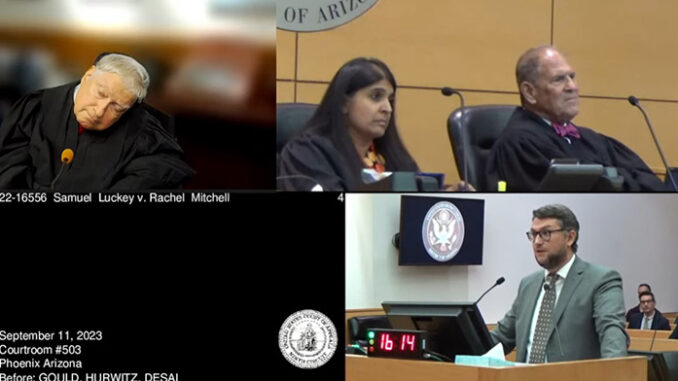
A loophole exists in Arizona law prohibiting abortions based on genetic abnormalities, according to counsel representing Arizona’s GOP lawmakers.
Alliance Defending Freedom senior counsel Denise Harle said that the only way an abortionist would violate the law is if a genetic defect is the only reason given for obtaining an abortion. Harle presented the argument on Monday before the Court of Appeals for the Ninth Circuit in Isaacson v. Mayes. Harle argued on behalf of House Speaker Ben Toma and Senate President Warren Petersen, both who support the abortion ban.
Harle’s argument prompted a back and forth with Judge Andrew Hurwitz; the latter seemed to be processing Republicans’ allowance of such a loophole to the law. Hurwitz posed a hypothetical of an overburdened mother resembling the protagonist of the Mother Goose nursery rhyme; except in Hurwitz’s version, the fictitious mother opts to end the life of her unborn, genetically defective child.
“[The mother says,] ‘Gee, I have 14 children, I live in a shoe. I would like to terminate my pregnancy for that reason. But there’s also a side benefit here which is that there’s a genetic defect in this child and I don’t wish to bear a child for that reason.’ [The doctor] is not violating the law?” asked Hurwitz.
“That’s correct,” responded Harle.
“A woman has to make known to a doctor that’s the sole reason she’s seeking [the abortion] and the doctor has no duty of inquiry?” asked Hurwitz in a follow-up question.
“That’s right, that’s exactly why the plaintiffs are making this argument, they’re declining to have conversations because they don’t want to acquire the knowledge that would mean they cannot perform the illegal conduct,” responded Harle.
“So your client’s interpretation of the law is that if a woman comes in to see a doctor and says ‘My child has a genetic defect, I would like an abortion.’ The doctor says, ‘I can perform it as long as you don’t tell me that’s the sole reason, and don’t say a word,’” asked Hurwitz. “And then the statute is not violated?”
Again, Harle affirmed.
Hurwitz pointed out that this allowable loophole was beneficial for opposing counsel.
“That would be very helpful information for the plaintiff’s lawyers to have,” said Hurwitz.
Hurwitz repeated his hypothetical again, driving home the import of Harle’s argument.
“If the doctor does not thereafter acquire information that [the genetic defect] is the sole reason that [a woman] wants an abortion, the doctor is free under the statute to perform the abortion?” asked Hurwitz.
Harle said that was correct. Hurwitz appeared surprised at Harle’s response.
“Really?” said Hurwitz. “Okay.”
Another point of interest during the oral arguments concerned the presence of one of the judges.
While Hurwitz and Judge Roopali Desai had an abundance of questions for Harle, challenging many of her statements, it’s unclear what Judge Ronald Gould heard. He didn’t ask any questions. Gould only spoke twice during that case’s oral arguments: first, to haltingly ask for the audio to be adjusted, which, incidentally, used up some of the time reserved by the plaintiff’s counsel, and second, to ask for Hurwitz to lean in closer to his mic to repeat a question.
“The audio is a little hard to follow,” said Gould.
In fact, Gould was largely silent throughout the oral arguments in the two cases that preceded Isaacson v. Mayes on Monday.
Gould was also not present with Hurwitz and Desai at the Sandra Day O’Connor Courthouse in Phoenix, instead appearing remotely. That may indicate a lack of fitness to travel or a scheduling conflict.
